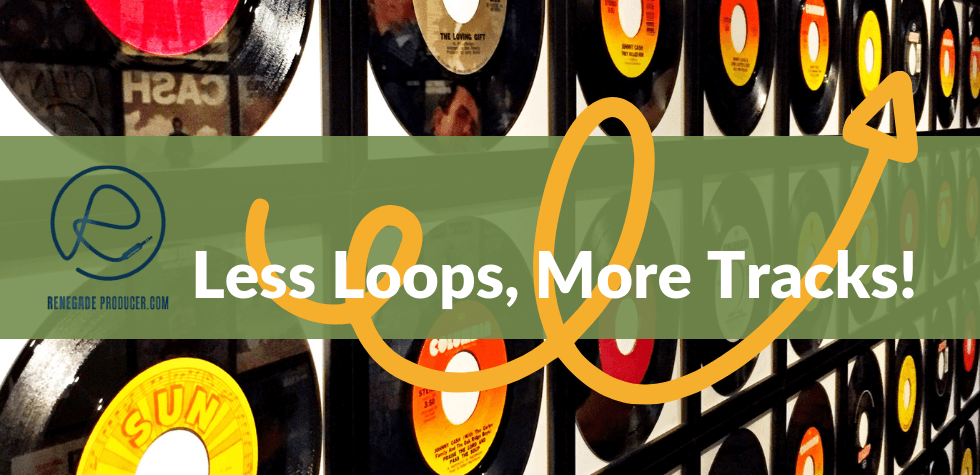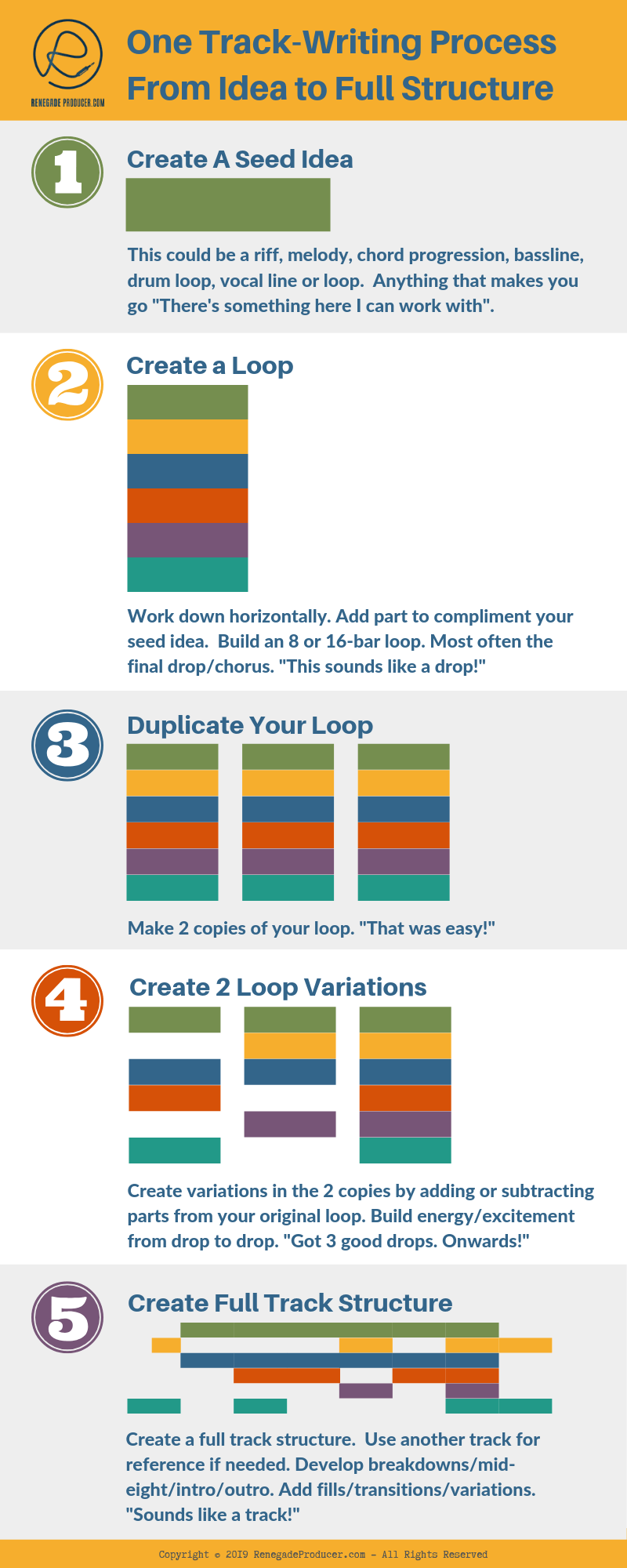25-step music production process checklist and video workshop >>>
Make Tracks Not Loops: Discover How to Overcome 8-Bar Loop Syndrome With This Quick Easy Guide!

Dems the Loopy Fruits...
Producers like me and you need to make tracks not loops. That's just a cold hard fact.
Now, we all know the dreaded 8-bar loop syndrome too well. You know, you create your loop and listen to it a gazillion times, get tired of it, close your DAW project and go watch some Netflix instead.
In this post I'll share with you a quick way, actually two ways, to get beyond the infinite repeat of the dreaded loop cycle and break free with ease.
Revealed: How to Make Tracks and Not Just Loops
Look, we here at RenegadeProducer.com don't discriminate against loops. In fact, loops are the basic building blocks of beats and electronic music. You have to start a track somewhere and a loop is more than just a seed idea.
Now, while your loop can form the basis of your full track, it's necessary to go beyond the loop and create a full track structure if you want to produce music people want to listen to. This means you must escape the loop, break the cycle and move beyond the limits that hold you back in an infinite regress of 8 bars.
So, just how do you make tracks not loops?
There are 2 ways to achieve this easily without getting stuck in a loop:
- Start with your track structure first.
- Create variations of your loop and then move on to your track structure.
In the first case you simply have to start to work horizontally instead of vertically. So, instead of stacking your instruments and sounds one on top of the other to create a loop you first create the horizontal or left-to-right framework. You then start to work vertically section by section until you've written your full track.
In the second case you start to work vertically. You create a loop but move on to your horizontal track structure as soon as possible. You do this first with variations of your loop and then move on to a full track structure as soon as possible to not get stuck.
So, step-by-step it works like this:
- Create your seed idea. A melody, a riff, a chord progression, a drum loop, a bass line. Anything.
- Create a loop by adding parts until you have a loop, usually your final drop or chorus works best.
- Create 2 duplicates of your loop.
- Create 2 variations of your main loop.
- Create your full track structure and develop your breakdowns/verses, mid-eight section and intro and outro.
This second method can be visualized like this:

More Tips to Help You Make Tracks Not Loops:
1. Use the Power of Deadlines
You've probably heard of Parkinson's law by now:
"work expands so as to fill the time available for its completion"
So, without a strict deadline your brain assumes it has infinite time available to complete a track. Riddle me this: How fast do you need to work when you have infinite time available to complete a task? That's right. You can take your sweet blurry time with it!
Use this law to your advantage. Set deadlines and stick to them.
Give yourself 24 hours to complete the track and if you don't delete it.
OK, so you may have to delete a track or two but guess what. After losing a track or two you'll start to realize the stakes involved and make sure you get it done before the 24th hour comes to an end.
2. Many Moves, Few Listens
One of the suggestions I give to students in my Studio Flow producer workflow course is to make many moves but restrict the amount of times you listen to your loop or track.
The reason this is so important is because the more you listen to your loop or track the higher the chances you'll get tired of the track and start to believe it's really not that good. Here's the secret:
Nobody will ever listen to your track as many times as you do when you produce your track. So, while you may think it's kind of boring even just after the 50th time you've heard it, other people won't have that problem because they'll probably never even come close to hearing the track that many times.
The way to negate this inevitable boredom with your loop or track is to restrict the amount of times you listen to it as you're working on it. You want to rather zoom in to a small section you need to work on, work fast to make the moves you need to make to get the job done and then move on to the next section the moment you've done the task you set out to do.
Now, it may not be possible to completely avoid hearing your track a lot as you produce but this way you can at least keep the amount of listens to a minimum and thereby keep the whole thing a lot fresher to your ears.
3. Music Production Habits
Tips, tricks and tactics only go so far and often don't have a lasting impact. Habits, on the other hand, can make a real difference in the results you get with your music production in the long run.
So, when your habit is to make 8 or 16-bar loops you can call yourself a loop-maker. You have to however make tracks, not loops, if you want to be known as a music producer. So, sometimes it helps to remember that what you do consistently is what makes a difference.
Now, it's not as easy to practice how to finish tracks as it is to start tracks. You have to start and develop tracks before you're even able to practice how to finish tracks. Yes, you can download some stems to practice mixing and finalizing tracks in your genre. That's definitely a good hack. Do it for sure. Even that won't however help you practice the production of tracks from start to finish.
So, as you can imagine, it's about a mindset. The way you think about it influences the way you act about it, and when you think about it the obvious thing is to...
... make tracks, not loops!
Sidenote: Be sure to check out Steven Pressfield's "The War of Art" if you want to up-level your outlook when it comes to your craft as an artist and producer. It's a very quick read and a real perspective changer.
To Summarize:
The way to make tracks and not loops is to get into the habit of finishing full tracks. The more you train yourself to do this the better you become at it. This, as you know by now, isn't rocket surgery. ;-)
So, here's a quick recap of the strategies that can help you make tracks not just loops:
- You can start with your song structure first.
- You can create loop variations and then move on to song structure straight away.
- You can use the power of deadlines.
- You can implement the strategy of making many moves with few listens.
- You can cultivate the habit of finishing tracks instead of the habit of just making loops.
Try all these techniques and you'll soon be pushing out more tracks, more often. Remember to get the Studio Flow course if you find that you don't produce new tracks as consistently as you want to.
So, there you have it. Now, go forth and make more tracks!
P.S. You can improve your arrangement and song structure skills straight away with this PML course...
The Arrangement Course over at Production Music Live (outside affiliate link) teaches you the core concepts and methods you need to move from loop to full arrangement with your tracks.
You can get it as a single course, part of the Harmony bundle or included in the All Courses bundle. This course is an ideal way to get you thinking about song structure and started with a firm foundation for your arrangement skill-stack. Get it here to support RenegadeProducer.com at no extra cost to yourself. Thank you!
Share this post. Spread the knowledge so other producers can benefit too:
- Renegade Producer
- Become a Music Producer
- Tracks Not Loops
ⓘ Some pages contain affiliate links so I might earn a commission when you buy through my links. Thanks for your support! Learn more

